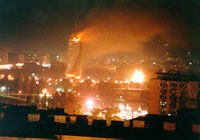Russia’s efforts to save Yugoslavia from NATO could have led to nuclear war
NATO troops attacked Yugoslavia ten years ago. Yugoslavia did not have any up-to-date arms to show resistance to the intense bombing. The military actions subsequently led to the separation of Serbia and Kosovo from the republic. Russia did not provide any military assistance to Slobodan Milosevic. Was there any opportunity for Russia to save Yugoslavia from NATO bombs?

Before the war of 1999, the West accused the Yugoslavian administration of ethnic cleansings of Kosovo Albanians. NATO demanded the deployment of its own troops in Kosovo after the withdrawal of Belgrade’s troops from the region. Belgrade responded with a refusal, and NATO launched the bombardment of military and civil objects of Yugoslavia on March 24, 1999.
Over 2,500 people were killed and about 5,000 were wounded during 78 days of the bombings. The economy of Yugoslavia suffered a 30-billion-dollar damage. President Slobodan Milosevic agreed upon the conditions of the West on June 10, 1999. NATO troops entered Kosovo, and local Albanians began to exterminate the Serbs. Many non-Albanians were forced out of the region.
The West recognized Kosovo’s independence in 2008 contrary to international laws. Kosovo Albanians celebrate the date of March 24 as their national holiday.
All of the above-mentioned events took place because Yugoslavia had no air defense systems.
“Russia and Yugoslavia signed the protocol on military cooperation in December 1998. However, Russia could not provide any military assistance to the country over the UN Security Council resolution, which banned any kinds of arms shipments to Yugoslavia. Russia upheld the resolution too,” historian Vladimir Putyatin told Pravda.ru.
“Technically, Russia was supposed to send its military specialists to Yugoslavia if it was ever going to ship military hardware, presumably air defense systems, to the country. The nation did not have such missile complexes. If Russia had made such a delivery, Yugoslavia would have been able to show resistance to NATO’s attacks,” the scientist said.
Anatoly Tsyganok, an expert with the Institute for Political and Defense Analysis, believes that Russia had missed its chances to exert influence on the situation in Yugoslavia. “We should have stayed in Pristina to have an opportunity to dictate our conditions from there,” he said.
Konstantin Sivkov, the first vice president of the Academy for Geopolitical Problems, told Pravda.ru that Russia did have a chance to help Yugoslavia, if Russia had the sufficient number of S-300 systems and personnel. The Yugoslavian Army was not defeated in the conflict. NATO’s Air Force destroyed less than one percent of Serbian troops.
One has to acknowledge that Russia was guilty of Yugoslavia’s collapse. Moscow put pressure on Milosevic and pushed him towards capitulation. It is worthy of note that NATO was about to end the military operations over the pressure from the general public.
The Parliament of Yugoslavia voted for the nation’s annexation to Russia and Belarus. Russia’s State Duma recommended then-President Boris Yeltsin to take those wishes into consideration, although Yeltsin did not agree to cooperate.
Alexander Khramchikhin, an expert with the Institute for Political and Defense Analysis, believes that Russia did not have an opportunity to defend Yugoslavia. “There was a threat to start a nuclear war with the USA. Russia has made such a mistake before, in 1914, when we became involved in WWI because of the Serbs. However, the Serbs have never helped Russia for some reason. Milosevic had a chance to avoid the war. The West did not consider him a bloody dictator prior to the events in Kosovo. He lost his chances to solve everything peacefully. He betrayed his nation with his capitulation. When it happened, NATO was considering the beginning of the land operation. If the Yugoslavian leader had decided to fight back, he should have done it to the bitter end. Otherwise he should have surrendered in the very beginning not to make his nation suffer. I do not understand why some of our patriots praise Milosevic as if he is a national hero,” the specialist said.
It is worthy of note that Russian and Yugoslavian officials were negotiating the issue of Russia’s debt to Yugoslavia in 1996-1997. The latter had a chance to receive S-300 complexes as debt payment. The Serbs declined the offer. The rest is history.
Sergei Balmasov
Vadim Trukhachev
Subscribe to Pravda.Ru Telegram channel, Facebook, RSS!


